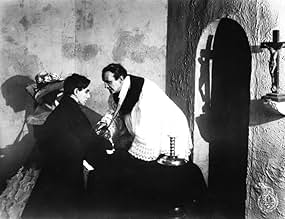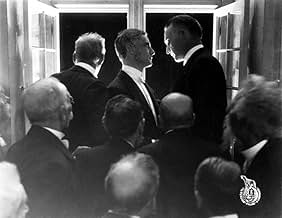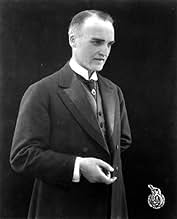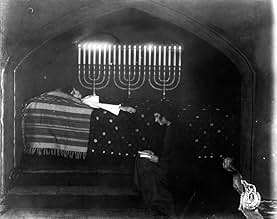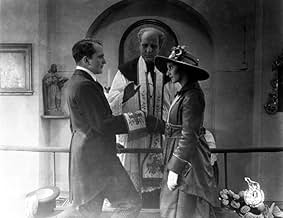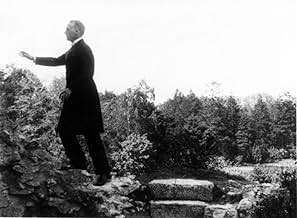IMDb RATING
6.6/10
1.1K
YOUR RATING
A judge sees his illegitimate daughter facing a trial for the murder of her newborn child, also out of wedlock. He is certain that she will be sentenced to death.A judge sees his illegitimate daughter facing a trial for the murder of her newborn child, also out of wedlock. He is certain that she will be sentenced to death.A judge sees his illegitimate daughter facing a trial for the murder of her newborn child, also out of wedlock. He is certain that she will be sentenced to death.
- Director
- Writers
- Stars
Carl Walther Meyer
- Rigsherre von Sendlingen
- (as Carl Meyer)
- Director
- Writers
- All cast & crew
- Production, box office & more at IMDbPro
Featured reviews
Dreyer is one of my favorite directors and his debut is one of the best debuts I've seen. The story is captivating, sometimes pretty brutal. Genuine tear-jerker.
Nice camera work, great musical score. A must-watch for fans of silent movies.
Nice camera work, great musical score. A must-watch for fans of silent movies.
Dreyer himself was a child born out of wedlock and given to adoption by an unwed woman who died soon thereafter. No wonder the sufferings of a woman are the marrow of many of his films.
The Danish woman is widely considered to be a rather high-spirited and free-minded creature. There are several films in the series issued by the Danish Film Intitute which show how women take things in their own hands, choose their men, inflict revenge upon them. But that is not the case in Præsidenten. This is a full blown melodrama about the constant sufferings of women, generation after generation. A pretty outdated concept by 1919 standards, and a pretty moralizing version of the eternal story of men taking advantage of women, having their way with them and abandoning them. There's a lot of honor and duty involved int the style of a proper Gilbert and Sullivan operetta, but unlike G&S, the film takes itself much too seriously. There are some highly unmotivated actions and a very, very weird scene, that seems to be either totally butchered or else the Danes lacked the knowledge of how babies are born completely - the barely pregnant governess is driven into the night, she collapses in the woods... and the next morning she is found lying there with the dead child by her side! So naturally she is blamed with infanticide at once. I don't know how exactly, but I find it hard to believe that reproduction worked like that. There's also a lot of bad make-up as all the young men also play themselves in their ripe years, so overall the results aren't very convincing. A somewhat tedious production, but worthy a viewing.
The Danish woman is widely considered to be a rather high-spirited and free-minded creature. There are several films in the series issued by the Danish Film Intitute which show how women take things in their own hands, choose their men, inflict revenge upon them. But that is not the case in Præsidenten. This is a full blown melodrama about the constant sufferings of women, generation after generation. A pretty outdated concept by 1919 standards, and a pretty moralizing version of the eternal story of men taking advantage of women, having their way with them and abandoning them. There's a lot of honor and duty involved int the style of a proper Gilbert and Sullivan operetta, but unlike G&S, the film takes itself much too seriously. There are some highly unmotivated actions and a very, very weird scene, that seems to be either totally butchered or else the Danes lacked the knowledge of how babies are born completely - the barely pregnant governess is driven into the night, she collapses in the woods... and the next morning she is found lying there with the dead child by her side! So naturally she is blamed with infanticide at once. I don't know how exactly, but I find it hard to believe that reproduction worked like that. There's also a lot of bad make-up as all the young men also play themselves in their ripe years, so overall the results aren't very convincing. A somewhat tedious production, but worthy a viewing.
This film is very interesting for various reasons. I will here look briefly at its style, which was explicitly made by Dreyer (confirmed in a letter to Erik Ulrichsen 11th March 1958, now in the Danish Film Museum) to make the interiors reflect the characters. For this, he modeled the sets after paintings by Vilhelm Hammershøi and James Whistler. This is very apparent if one looks at Whistler's portrait of his Mother against a gray wall, and the many Hammershøi paintings where he balances the model(s) also against gray, cool blue or white walls decorated with a few small portraits strictly arranged. I would also like to add that a lot of the white faces and hands, which Dreyer often frames in almost complete darkness, reminds me of how the graphic work by Edvard Munch can make any face look like a premature death mask. There is certainly in this film much interplay between the Nordic darkness of the soul and the barren interiors of the late aristocracy. These arrangements make the film appear as a well thought out study of how to balance painterly and cinematographic style. However, many of these carefully constructed scenes are very short. I would assume that longer takes would make for a very much more beautiful and contemplative film, but alas it would also slow down the hectic and melodramatic plot, which just gets more frantic with each scene, ending in a tour de force of cross cutting a la Griffith. So in a way the plot kills the style. Oh well.
The current version was created in 1999 from the original nitrate negative and released on DVD in 2004 by the Danish Film Institute. It is tinted in amber, blue and red. Compared with film stills I have seen in black and white, the DVD looks very dark. For example the scene when Karl Victor reads the letter informing him that it is his daughter that will be prosecuted for infanticide, the wallpaper behind him is completely obscured, making the white passepartout framing the portrait on the wall shine in the darkness. In the still of the same scene you can clearly see the pattern in the wallpaper around the picture, making the whole scene more naturally lighted. Since the lightning in the film as a whole is full of dark imagery, this loss of detail makes the film look more expressionistic and gloomy than originally intended. Of course, that might only make it more interesting for fans of Nosferatu, Vampyr and other Gothic nightmares. But Præsidenten is not a Gothic tale, but rather a moral melodrama typical of its time, with echoes of Ibsen, Strindberg and Söderberg (writer of Gertrud). But as seen in the current version, it certainly looks Gothic - and some might find its charm just because of that.
The current version was created in 1999 from the original nitrate negative and released on DVD in 2004 by the Danish Film Institute. It is tinted in amber, blue and red. Compared with film stills I have seen in black and white, the DVD looks very dark. For example the scene when Karl Victor reads the letter informing him that it is his daughter that will be prosecuted for infanticide, the wallpaper behind him is completely obscured, making the white passepartout framing the portrait on the wall shine in the darkness. In the still of the same scene you can clearly see the pattern in the wallpaper around the picture, making the whole scene more naturally lighted. Since the lightning in the film as a whole is full of dark imagery, this loss of detail makes the film look more expressionistic and gloomy than originally intended. Of course, that might only make it more interesting for fans of Nosferatu, Vampyr and other Gothic nightmares. But Præsidenten is not a Gothic tale, but rather a moral melodrama typical of its time, with echoes of Ibsen, Strindberg and Söderberg (writer of Gertrud). But as seen in the current version, it certainly looks Gothic - and some might find its charm just because of that.
This film by Carl Dreyer is titled 'The President' in the old-fashioned European sense of the word 'president': the title character is the presiding official of a European town; not quite the mayor, nor quite the chief magistrate. Like its title, this entire film is very much a product of the fading days of imperial Europe. The film's premise takes it for granted that aristocratic noblemen are somehow innately different from the common folk, with a different set of priorities, a different set of duties, and a different form of justice.
The film is set in 19th-century Denmark. The main plot is some hoo-ha about a greying blue-blood (Halvard Hoff) who must preside over the trial and sentence of a young governess (Olga Raphael-Linden) accused of murdering the child in her charge. The governess pleads guilty, but for some reason she's going to be put on trial anyway. (I know nothing about 19th-century Danish law; would a defendant who pleads guilty to a capital offence be made to stand trial?) The president abruptly learns that the governess is his own daughter, born of a tryst with a working-class woman whom he didn't marry due to their social disparity. Naturally, because this total stranger is his own daughter he must now intercede. What follows is mostly deepest bathos.
The action of this sprawling movie takes place over three generations. Two of the actors in this film (Hoff and Elith Pio) each play their characters at two radically different ages; unfortunately, the old-age makeup on these two young actors is very unconvincing. Also unconvincing is the hairpiece worn by Richard Christensen (the best actor in this film) as the governess's defence advocate. I was distressed that Christensen bears a striking resemblance to Michael Palin. Talking of makeup: the governess wears lip rouge in her death cell.
Whoever handled the set dressing on this movie should have cut down on the caffeine: one character's home is decorated with dozens of silhouette portraits, while another character's home is festooned with miniatures arranged in geometric patterns. The keys for the cells in the local prison are hung on a wall-rack shaped like a bat; it looks like it would have been more appropriate in Dreyer's film 'Vampyr'. One shot in this movie, depicting a servant seen only in shadow, reminded me of a famous shot in 'Vampyr'.
In all the long length of 'The President', Dreyer's camera hardly ever moves and always does so clumsily. Fortunately, Dreyer's static camera gives us some strikingly beautiful compositions. All of his exteriors are exquisitely framed and lighted. (I wonder if he used reflectors.) A few brief sequences are rather obviously shot day-for-night. I was impressed by one shot when lovers meet on a bridge; we see their reflections in the water rather than the lovers themselves.
There are a few weird lapses here. One character wears spectacles in medium-long shot, then Dreyer cuts to him in close-up and the spectacles are gone. The president's cook carries live terriers in a closed satchel with no airholes, to no ill effect. The cook is played by Fanny Petersen, who strongly resembles Beryl Mercer, one of the most annoying actresses in film history.
'The President' has many flaws, most notably a turgid and overly complicated storyline. However, Dreyer's directorial skill is manifest here, and most of his actors give good performances. I'll rate this deeply old-fashioned movie 6 out of 10.
The film is set in 19th-century Denmark. The main plot is some hoo-ha about a greying blue-blood (Halvard Hoff) who must preside over the trial and sentence of a young governess (Olga Raphael-Linden) accused of murdering the child in her charge. The governess pleads guilty, but for some reason she's going to be put on trial anyway. (I know nothing about 19th-century Danish law; would a defendant who pleads guilty to a capital offence be made to stand trial?) The president abruptly learns that the governess is his own daughter, born of a tryst with a working-class woman whom he didn't marry due to their social disparity. Naturally, because this total stranger is his own daughter he must now intercede. What follows is mostly deepest bathos.
The action of this sprawling movie takes place over three generations. Two of the actors in this film (Hoff and Elith Pio) each play their characters at two radically different ages; unfortunately, the old-age makeup on these two young actors is very unconvincing. Also unconvincing is the hairpiece worn by Richard Christensen (the best actor in this film) as the governess's defence advocate. I was distressed that Christensen bears a striking resemblance to Michael Palin. Talking of makeup: the governess wears lip rouge in her death cell.
Whoever handled the set dressing on this movie should have cut down on the caffeine: one character's home is decorated with dozens of silhouette portraits, while another character's home is festooned with miniatures arranged in geometric patterns. The keys for the cells in the local prison are hung on a wall-rack shaped like a bat; it looks like it would have been more appropriate in Dreyer's film 'Vampyr'. One shot in this movie, depicting a servant seen only in shadow, reminded me of a famous shot in 'Vampyr'.
In all the long length of 'The President', Dreyer's camera hardly ever moves and always does so clumsily. Fortunately, Dreyer's static camera gives us some strikingly beautiful compositions. All of his exteriors are exquisitely framed and lighted. (I wonder if he used reflectors.) A few brief sequences are rather obviously shot day-for-night. I was impressed by one shot when lovers meet on a bridge; we see their reflections in the water rather than the lovers themselves.
There are a few weird lapses here. One character wears spectacles in medium-long shot, then Dreyer cuts to him in close-up and the spectacles are gone. The president's cook carries live terriers in a closed satchel with no airholes, to no ill effect. The cook is played by Fanny Petersen, who strongly resembles Beryl Mercer, one of the most annoying actresses in film history.
'The President' has many flaws, most notably a turgid and overly complicated storyline. However, Dreyer's directorial skill is manifest here, and most of his actors give good performances. I'll rate this deeply old-fashioned movie 6 out of 10.
"Praesidenten" is the first film of the great Danish film director Carl Theodor Dreyer and, for this German count, this debut is a perfect example of Dreyer's film style. It's one, with degrees of variation, he would maintain in his silent films as well as in his talkie career.
"Praesidenten" is a film perfectly constructed (the film is divided into three different but interrelated parts). Flashbacks are used to depict the terrible story of Danish noblemen who dare to fall in love with common girls; such huge mistakes will have serious consequences for the main characters as Herr Von Sendlingen says to his son at the beginning of the film, "never marry a commoner, for no good ever comes of it, naught but curses and remorse " ah, wise words, indeed!.
"Praesidenten", besides having a solid and narrative film structure very well rendered, has an elegantly slow pace, this is very characteristic in Herr Dreyer's films, film cadences and pauses endow the story with intensity and emotive nature, showing the vicissitudes of three generations of a family broken due to impossible or imprudent relationships. When at the end of the film the main character has the opportunity to atone his sins and make amends with the past, he finally carries the burden of stricter convictions and codes of honor.
"Praesidenten" is a solid debut, one with graceful and delicate pacing a perfect example of the Herr Dreyer oeuvre.
And now, if you'll allow me, I must temporarily take my leave because this German Count, as President of the "Associated Aristocrats Foundation" must attend another decadent meeting.
Herr Graf Ferdinand Von Galitzien
"Praesidenten" is a film perfectly constructed (the film is divided into three different but interrelated parts). Flashbacks are used to depict the terrible story of Danish noblemen who dare to fall in love with common girls; such huge mistakes will have serious consequences for the main characters as Herr Von Sendlingen says to his son at the beginning of the film, "never marry a commoner, for no good ever comes of it, naught but curses and remorse " ah, wise words, indeed!.
"Praesidenten", besides having a solid and narrative film structure very well rendered, has an elegantly slow pace, this is very characteristic in Herr Dreyer's films, film cadences and pauses endow the story with intensity and emotive nature, showing the vicissitudes of three generations of a family broken due to impossible or imprudent relationships. When at the end of the film the main character has the opportunity to atone his sins and make amends with the past, he finally carries the burden of stricter convictions and codes of honor.
"Praesidenten" is a solid debut, one with graceful and delicate pacing a perfect example of the Herr Dreyer oeuvre.
And now, if you'll allow me, I must temporarily take my leave because this German Count, as President of the "Associated Aristocrats Foundation" must attend another decadent meeting.
Herr Graf Ferdinand Von Galitzien
Did you know
Details
- Runtime1 hour 25 minutes
- Sound mix
- Aspect ratio
- 1.33 : 1
Contribute to this page
Suggest an edit or add missing content


